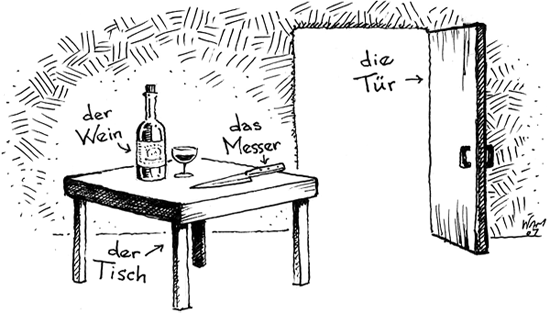![]() Nouns:Genus der Substantive
Nouns:Genus der Substantive
In a rare bow to logic, German noun genders actually make sense when they match the biological gender of the noun.
| der Vater (the father) | die Mutter (the mother) |
| der Sohn (the son) | die Tochter (the daughter) |
Other times the genders are pretty randomly assigned. Only one thing is for sure: every German noun has a grammatical gender, which you should learn just like you learn the plural form (because there is no real logic to either one!). The genders are indicated with an article preceding the noun: der for masculine, die for feminine and das for neuter nouns.
| Masculine |
| der Tisch (the table) |
| der Bach (the creek) |
| der Wein (the wine) |
| Feminine |
| die Tür (the door) |
| die Blume (the flower) |
| die Brille (the eyeglasses, in German this is a singular noun!) |
| Neuter |
| das Messer (the knife) |
| das Nachthemd (the nightgown) |
| das Käppchen (the cap) |
Although you do have to memorize noun genders, there are some other hints that can help you remember if a noun is der, die or das. Check this out:
If the noun ends in -er, -en, -ig, -ling, -us, -mus, -or, chances are it's masculine.
If the noun ends in -in, -ion, -ung, -heit, -keit, -schaft, -ei, -ur, -ik, -tät, -anz, -enz, -ie, it's feminine.
If the noun ends in -tum, -chen, -lein, -ment, -um (-erl, -le, -el, -li = dialect variants), it's neuter.
And sometimes Germans themselves can't agree on the noun gender! This can happen when new words are borrowed from other languages and adopted into German, like the word for yogurt: some Germans call it das Joghurt (northern Germany) and der Joghurt (southern Germany).

![]() Übung: Das Leben im Schloß (Noun Genders and Articles)
Übung: Das Leben im Schloß (Noun Genders and Articles)
During a recent group therapy session, Little Red Riding Hood, her grandmother, and the hunter try to recall the details of their harrowing run-in with the wolf (initially, they had repressed all memories of this traumatic experience). The psychologist takes notes on what happened that fateful day. Please fill in the missing articles.
| 1. | __________ Mutter gibt Rotkäppchen ein Stück Kuchen und eine Flasche Wein. |
| 2. | __________ Mädchen soll sie zu ihrer Großmutter bringen. |
| 3. | Aber __________ Wolf wartet auf (waits for) Rotkäppchen. |
| 4. | Er sagt: "__________ Blumen riechen sehr gut. Du solltest einige sammeln (gather)!" |
| 5. | __________ Großmutter wartet auf ihr Enkelkind (grandchild), aber statt ihr kommt __________ Wolf. |
| 6. | __________ Haus steht in der Mitte des Waldes. |
| 7. | __________ Wolf klopft an __________ Tür, und Großmutter lädt ihn ein (invites him in). |
| 8. | Er kommt in __________ kleine Stube (room) und frißt __________ alte Frau auf. |
| 9. | Rotkäppchen kommt mit dem Korb und den Blumen, und sieht, daß ___________ Ohren und __________ Augen von ihrer Großmutter sehr groß sind. |
| 10. | Das war natürlich nicht __________ Großmutter, sondern (but) __________ Wolf! |
| 11. | __________ böse Tier frißt auch sie auf. |
| 12. | __________ Jäger hört zu und denkt: Wie __________ alte Frau schnarcht (snores)! |
| 13. | Im Haus liegt __________ Wolf im Bett! |
| 14. | __________ Schere (scissors) liegt auf dem Tisch und er schneidet den Bauch des Wolfes auf (cuts open). |
| 15. | __________ Großmutter und __________ kleine Mädchen springen aus seinem Bauch. |
| 16. | Rotkäppchen holte einige große Steine und __________ Jäger füllte dem Wolf den Leib. |
| 17. | Als __________ Wolf aufwachte, wollte er fortspringen aber __________ Steine waren sehr schwer und er starb (died). |
